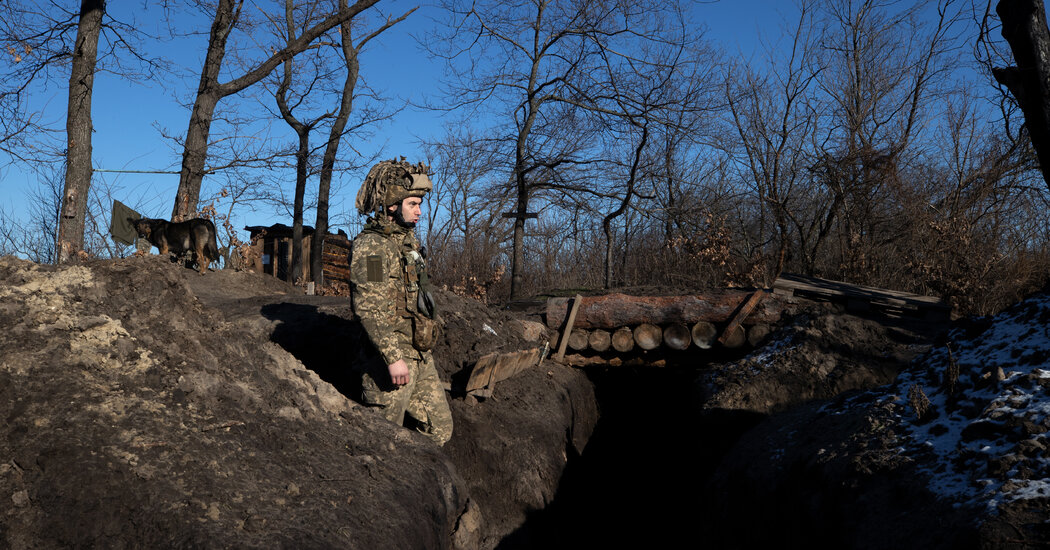
KYIV, Ukraine — Even as rocket attacks continued in eastern Ukraine, and as Russian soldiers remained massed at the borders for what Western leaders call an imminent invasion, people in Ukraine’s capital, Kyiv, paused on Sunday to remember another moment of peril: the gunning down, eight years ago, of dozens of protesters by Ukraine’s government, which was then aligned with Moscow.
In Maidan square, the site of the massacre, a ceremony was held on Sunday morning to honor the “Heavenly Hundred,” as those killed on Feb. 20 and 21, 2014, are known here. More commemorations were planned in Kyiv and elsewhere in Ukraine.
The ceremony began with a rendition of the national anthem, followed by a rifle salute and a solemn procession of people laying flowers at the location where many were killed.
Iryna Horbachova, with tears in her eyes, said just as the people fought then, the nation is ready to fight again.
“For our identity, for our freedom,” she said.
“For our right to live in the kind of Ukraine we want. Not the kind into which Putin and Russia wants to drive us to,” referring to President Vladimir V. Putin of Russia.
Ukraine’s current government is invoking the spirit of the 2014 protest movement to rally the nation as it faces a far graver threat — a crisis that, like the earlier one, stems from Moscow’s desire to keep Ukraine from drawing closer to the West.
President Volodymyr Zelensky, who visited the square Sunday, said the people who died gave their lives “for the right to live in an independent state, in the family of European nations.”
“Their feat is a testament to the steadfastness of Ukrainians who continue to fight for their future,” he said.
It was a decision by the president at the time, Viktor F. Yanukovych, not to sign an agreement that would have brought Ukraine closer to the European Union that spurred tens of thousands of people to take to the streets in late 2013. As the protests grew, Maidan square, in central Kyiv, became the focus of international attention — and, then, global shock at the killings.
The protesters, at great personal risk, persevered. For days, they tossed their tents, sleeping bags and endless numbers of tires onto a barrier of fire, hoping to ward off the security forces.
After the massacre in the square, Mr. Yanukovych negotiated a deal with French and German intermediaries to stay in power in exchange for a promise of early elections. But the protesters negotiated their own arrangement with midlevel security service commanders, who understood that Mr. Yanukovych intended to remain in power by blaming them for the shootings.
Under the deal, the police commanders vacated the city, escaping prosecution, but also leaving Mr. Yanukovych and his inner circle without police protection.
Mr. Yanukovych fled to Russia, and Ukraine’s Parliament voted to oust him from office. New elections were held. But Moscow soon responded. Its soldiers, insignia removed from their combat fatigues (Ukrainians referred to them as “little green men”), seized Crimea. And a Russia-backed separatist movement emerged in the eastern Donbas region, starting an armed conflict that has never stopped and is now rising sharply again.
Shelling rose significantly there on Saturday. Separatist leaders urged a mass evacuation to Russia and called men to arms — claiming, with no evidence, that Ukraine was planning a large-scale attack on territory they control.
Just as many Ukrainians in 2014 were stunned that a massacre could take place in their capital, some are finding it hard to accept that a full-scale Russian invasion of Ukraine is possible. The idea that Russia is planning “the biggest war in Europe since 1945,” as Prime Minister Boris Johnson of Britain warned in a BBC interview this weekend, is something that many in Kyiv simply refuse to believe.
Mr. Zelensky also invoked the nation’s recent history on Saturday in Munich, when he called on Western leaders to place sanctions on Russia now, before an invasion takes place.
“Eight years ago,” he said, “Ukrainians made their choice, and many gave their lives for that choice.”




